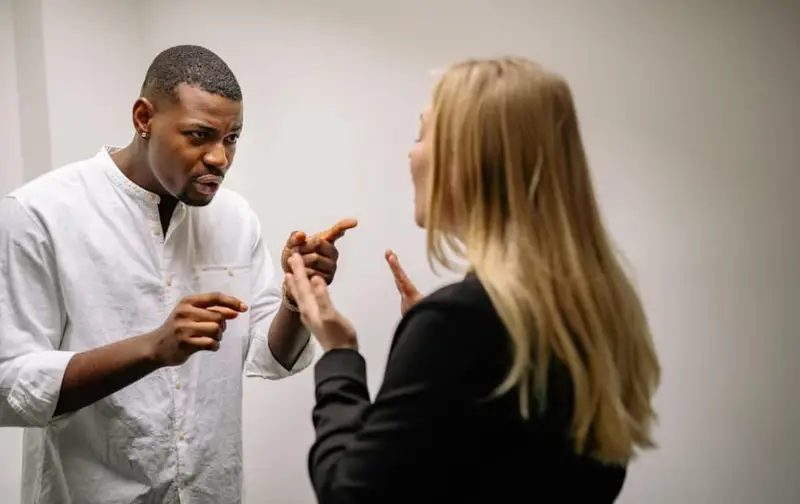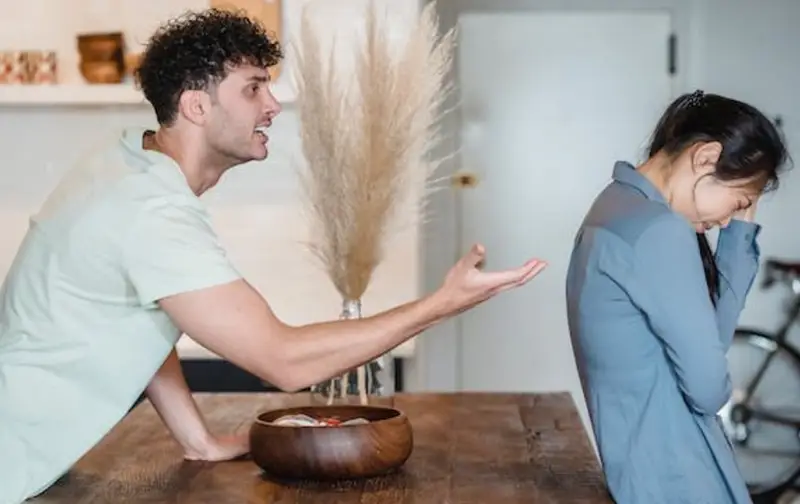Without accountability in relationships, couples will only tolerate each other instead of enjoying the relationship. Partners must make an effort to accept responsibility for their behavior if the relationship must blossom.
However, an accountability partner in a relationship doesn’t mean the absence of conflict. You and your partner may be the most positive people on the planet (and that’s great!), but one thing is certain: your relationship will not always be rosy!
Now, this is not intended to discourage you, but that’s the nature of relationships, especially a romantic relationship.
Relationships aren’t always a bed of roses, no matter how committed both partners are.
The reason for this is simple: humans are not perfect. We can be all loving and understanding in one minute and cranky the next. Left unchecked, this can cause cracks in relationships.
Thankfully, you can significantly reduce conflicts and unnecessary fights in your relationship if you know how to practice accountability with your partner. And while no relationship is perfect, you can leverage the power of accountability to make your relationship a predominantly happy one.
That’s exactly what you’ll learn in this article, as I share useful tips to help couples be more accountable in their relationships.
What Does Accountability in Relationships Really Mean?

In an earlier post, I talked about the importance of developing self-accountability. But taking responsibility for your behavior and owning your shortcomings can be a bit more challenging when you are in a romantic relationship.
Here’s why.
You expect your partner to accept you as you are without trying to change you. Besides, you are not responsible for how your partner (or any other person) feels.
All of that may be true, but doing whatever pleases you with zero regard for your partner’s feelings hardly makes for a loving, successful relationship.
Both partners in a healthy relationship must always consider each other’s feelings and take responsibility for their words and actions.
But what exactly is accountability in relationships? Here’s a hypothetical situation to help answer the question.
Jane feels that John, her fiancé, is losing interest in their relationship. She complains and lashes out at John in anger because she fears losing her man and the relationship she’s built for several years.
On the other hand, John feels harshly criticized and unfairly blamed by Jane, even though he’s doing his best. Overwhelmed by her nagging, John leaves home and spends the night out.
John’s behavior confirms Jane’s fears ― he no longer cares about her and the relationship, and she feels she’s not good enough for him. Jane calls her man, but he doesn’t answer. She sends barrages of angry messages to John, who doesn’t respond.
John comes home the next day and refuses to talk about the situation. He simply says, “I’m not in the mood for your bickering,” when Jane asks where he’s been. And the negative cycle continues.
Does this sound familiar?
It is never one person’s fault when things aren’t working in a relationship because it takes two to tango. Taking responsibility in a relationship simply means recognizing and accepting your role in a problematic situation involving your partner.
In other words, you acknowledge the effects of your behavior on your partner. And although you may not have directly caused the problem, you own the part you played in continuing the negative cycle.
Accountability in relationships means reflecting on how you contribute to your partner’s unwanted behavior and proactively making positive changes to create a happier and healthier relationship.
This summarizes what it means to be accountable in a relationship.
Should You Take the Fall?

A common mistake with couples is accepting blame for something they didn’t do because they think that’s taking personal responsibility.
Whether or not you take the fall for your partner’s actions is entirely up to you. But doing so is not the same as accountability.
If anything, accepting misplaced blame (in the name of taking personal responsibility) clearly indicates an unhealthy relationship. In most cases, one partner is a manipulator in relationships where:
- One person always accepts all the mistakes as their fault (even when they are not).
- The victim usually makes excuses for their partner’s behavior.
- One partner is always engaged in self-blame.
Toxic relationships like codependent ones are often characterized by the manipulator shifting all the blame to the victim and the latter accepting the fault (sometimes unconsciously).
If this goes unchecked, both partners will eventually accept the unhealthy behavior as normal. This can negatively affect the relationship as well as the mental and emotional health of the individuals, particularly the victim.
Want to learn more? I recommend reading this article to understand the difference between blame and accountability in relationships.
Why Accountability Is Important in Relationships

Partners taking responsibility for their behavior leads to a healthy relationship because each partner feels valued by the other person. And because partners do their best to consider each other’s feelings, the relationship doesn’t feel one-sided.
Openness and honesty are promoted in relationships where both partners practice accountability. And because they trust each other, partners are comfortable showing their vulnerable side in such relationships.
Being accountable isn’t only about improving your relationship; it helps you become a better human being by making you more empathic and compassionate. Accountability helps you to walk in your partner’s shoes and see things from their perspective.
Above all, taking responsibility makes you more self-aware as you continuously reflect on your behavioral triggers and how to overcome them.
Are there consequences for not practicing accountability in relationships?
You bet there are!
Positive changes don’t happen in a relationship by accident. If partners aren’t willing to make an effort, they will remain in an unhealthy and unhappy relationship.
The alternative would be to go their separate ways with the wrong notion that the other person is at fault.
Unfortunately, people who walk out of relationships without making any effort to be more accountable often end up repeating the same negative cycle with a new partner.
Bottom line: If you truly love someone, quit the blame game, and learn to practice accountability to make your relationship blossom.
Tips for Practicing Accountability in Relationships

So far, I’ve discussed what accountability looks like in relationships, the difference between accepting misplaced blame and taking responsibility, and why accountability is important in relationships.
It’s time to see practical ways to implement accountability in real-world situations, particularly in a romantic relationship.
Communicate Your Intentions
Lack of communication can cause serious cracks in relationships, romantic or otherwise. Consider involving your partner in the process of building accountability, and don’t be afraid to have difficult conversations.
Here’s why.
An accountability partnership is best when it is a collaborative effort. Before you communicate your intentions to your partner, make sure the mood is right.
Talk with them when they are calm and in a generally happy state of mind. Avoid bringing up the discussion when there’s conflict, as that could be misconstrued as trying to blame them.
Reflect on Your Strengths and Weaknesses
Create time to think about your strengths and how you have used them to improve your relationship so far.
Next, ponder on your flaws and how they affect your partner and the quality of your relationship.
Whether or not you involve your partner in the accountability process, it is important to be honest with yourself when you take stock of your strengths and weaknesses.
Do you ignore your partner or easily shut down during conflict? Does it have something to do with being too sensitive? Maybe you are always overthinking issues, and the behavior is affecting your relationship.
Can’t put your finger on your strengths and weaknesses? Consider writing down your thought processes, feelings, and behaviors, particularly as it concerns your relationship. Do this every day for a few days or weeks, and then go over your journal to see the recurring pattern.
Whatever you come up with ― strengths and weaknesses ― can help you focus your energy on ways to improve.
Seek Feedback
Again, communication is a huge success factor in any relationship. Remember that you’re in a partnership with another individual, and their opinions, expectations, and feelings must be respected.
To improve accountability, ask your partner what they think of the partnership. How has it been going for them? Is there something they would like in the relationship but is currently missing? What positive changes would they like to see? What can you work on together to increase the fun, love, joy, and happiness you share?
As always, make sure to ask for feedback only when you both are relaxed and calm. Even if there is an unresolved issue, you can calmly bring it up without being defensive. Make sure to listen to your partner and be open to suggestions. Create a deeper connection and speak with honesty.
Respond to Situations Instead of Reacting
No matter how hard you try, you can’t completely avoid friction in your relationship ― no one can. All couples experience these things, and it is normal.
However, one useful way to reduce frequent conflict is to pause for a while before responding. This practice is particularly helpful when negative emotions run high.
Getting defensive when your partner calls you out for your behavior can lead to more friction because you are acting from a reactionary place.
Practice pausing for a few seconds and taking a few deep breaths to douse your emotions before responding.
This way, you will respond to the situation from a place of clarity. Pausing before responding can also help you mentally take a step back to consider the situation from your partner’s point of view.
Okay, I know all of these sound great in theory. However, it is a completely different ball game in reality. It takes a lot of practice to anticipate and checkmate your emotions, especially in the heat of the moment.
I recommend including meditation in your daily practice to help you become more attuned to your physical, emotional, and mental states.
Admit Your Mistakes and Own Your Behavior
A huge part of being accountable is your ability to admit that you are wrong. This can be very challenging for partners with a bloated sense of self, particularly people who confuse ego for high self-esteem.
Be honest with your partner and acknowledge what you did instead of dismissing your partner, denying your behavior, or defending yourself.
Remember, playing the blame game is easy, but it doesn’t help your relationship. If anything, it can lead to resentment.
Apologize When You Are Wrong
Taking responsibility for your behavior in a relationship involves apologizing when you are wrong. Avoid making excuses when you mess up. Say you are sorry and mean it.
That said, remember that saying “I am sorry” tends to lose meaning after a while. This is especially true when it is said for the same mistake over and over again.
When you apologize, make sure it is a sincere apology. That means making a promise to yourself and your partner not to repeat the behavior for which you are sorry. Make sure you commit to fulfilling your promise by behaving differently in more positive ways.
Work as a Team
You can practice accountability exercises yourself, but working with your partner can make your relationship more blissful.
If you choose to do this, make sure you don’t put your partner in a defensive position.
Here’s what I mean.
Ask your partner how they would prefer to be supported instead of imposing your ideas or suggestions on them.
For example, if your partner wants to create more time for self-care, ask what you can do to encourage them. Say something like, “That’s great. What can I do to help?” Avoid saying things like, “Yes, I think you should do X and Y because that’s better for you.”
Considering your partner’s feelings means allowing them to come up with ways they want you to be supportive rather than telling them what they should do for their own good.




